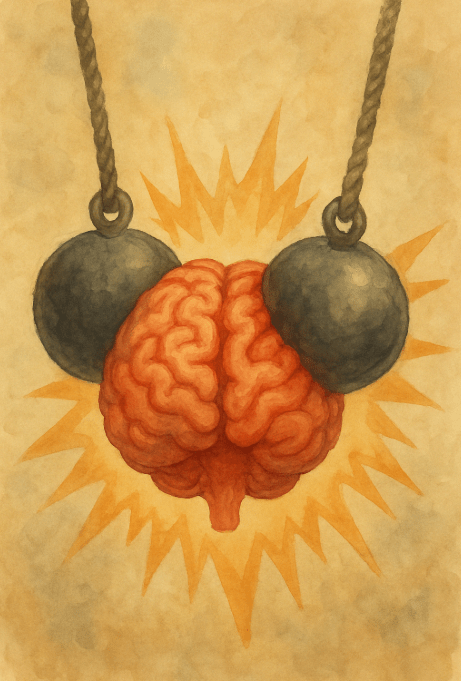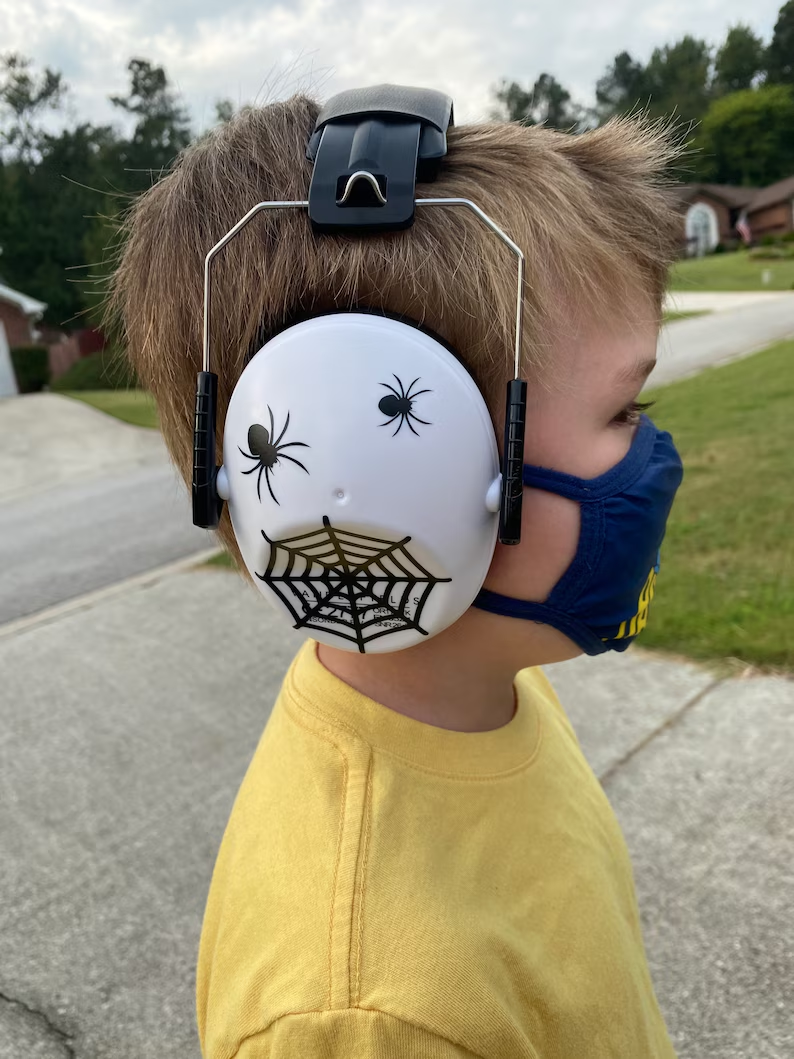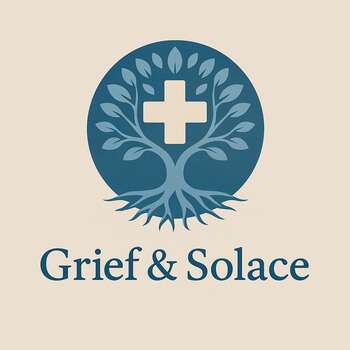Grieving Traumatic Brain Injury (TBI): Mourning the Mind Behind the Eyes
Grief with TBI is a heavy silence, watching someone stay alive but lose pieces of themselves no therapy can fully recover.

This post blends real grief with grounded knowledge. It isn’t clinical. It isn’t distant. It’s meant to sit beside you—not above you. The story you’ll read is meant to reflect what so many feel when living through or witnessing this condition: confusion, exhaustion, and quiet forms of courage.
If what you read feels familiar, please speak with your doctor. Your pain deserves more than silence.
His Eyes Looked the Same, but the Man Behind Them Had Changed
He came home walking, but there were no casts, no scars visibly marking him. No missing limbs, no medals, no headlines shouting his survival. Just a small tremor in his left hand and a silence that stretched a little too long between words. They said it was mild…“blast exposure. Could be worse.” But he never went back to who he was before the impact.
He forgot things…small at first…keys, appointments, the names of old neighbors. Then gradually, bigger things…conversations, faces, what day it was. And when he tried to speak, words came out sideways…wrong nouns, half-thoughts, long pauses that looked like hesitation but were really just him trying to find the thread. People thought he was fine because he looked fine, but he wasn’t.
🧠 Symptoms:
– Symptoms vary based on severity (mild, moderate, severe) and onset timing
– Mild TBI (concussion): headache, nausea, fatigue, dizziness, balance issues; sensory disturbances like blurred vision, ringing ears, light/sound sensitivity; confusion, disorientation, memory problems, mood swings; sleep changes
– Moderate to severe TBI: prolonged unconsciousness, worsening headache, vomiting, pupil dilation, clear fluid from nose or ears, weakness, numbness, coordination problems, slurred speech, agitation, coma
– Pediatric red flags: persistent crying, irritability, seizures, sleep issues, loss of interest in play, feeding problems
He got angry faster, louder…at things he wouldn’t have blinked at before. Then he’d disappear for hours—into the garage, into himself—ashamed of the outbursts, even he didn’t understand. And I stayed. I tried to meet him where he was, but where was he?
Some days, he was almost there…smiling at old jokes, sitting still in conversation. Other days, he was like static—glazed eyes, an emotionless voice. The body I loved, but not the man. Traumatic Brain Injury. No reset button, no clean line between before and after—just this: a man grieving the mind that used to feel reliable.
Complications:
– Altered consciousness: coma, vegetative state, minimally conscious state, brain death
– Physical issues: seizures, hydrocephalus, infections, vascular damage, headaches, vertigo
– Cranial nerve damage: facial paralysis, vision/hearing loss, swallowing problems
– Cognitive and emotional problems: memory, attention, executive function deficits, depression, mood swings, aggression, anxiety
– Communication/social issues: speech difficulties, social disinhibition, misreading cues
– Sensory impairments: tinnitus, altered smell or taste, visual disturbances, balance problems
– Long-term risks: increased chance of Alzheimer’s, Parkinson’s, dementia pugilistica (repetitive trauma)
Causes:
– Falls (most common, especially in elderly and children)
– Motor vehicle accidents
– Violence (gunshot wounds, abuse, shaken baby syndrome)
– Sports injuries
– Explosive trauma (military-related)
– Penetrating injuries (shrapnel, skull fractures)
We went to therapy, occupational, cognitive, and speech. Every small gain was a celebration—a remembered word, a full sentence, a single night without waking up screaming. And every setback? It hurt like the first time. He once whispered, “I hate how people talk to me now, like I’m broken glass they don’t want to touch.” I didn’t know what to say, because sometimes, I talked to him that way, too.
But he kept going. Even through the fog. Even when his brain betrayed him. He tried. And slowly, we built something new. Not what we had, but what he could still hold.
Risk Factors:
– Children under 4
– Teens aged 15–24
– Adults over 60
– Males at any age
He came back changed. Not less—but different. And even when his thoughts didn’t come clean, his love always did.
📘 Diagnosis & Treatment
Diagnosis
– Glasgow Coma Scale (GCS) to evaluate responsiveness
– CT scan in emergencies
– MRI after stabilization
– Intracranial pressure monitoring if swelling is severe
– Observation and detailed history, especially in mild cases
Treatment
Mild TBI
– Rest, monitoring symptoms, gradual return to activity
– Encourage light activity; avoid over-resting
Moderate to Severe TBI
– Ensure airway, oxygenation, circulation
– Prevent further injury or complications
– Medications: anti-seizure drugs short-term, diuretics, coma-inducing agents to reduce brain pressure
– Surgery: hematoma removal, skull repair, CSF drainage, decompression surgery
– Rehabilitation: physical therapy, occupational therapy, speech/language therapy, neuropsychology, social support, vocational rehab
Coping & Support
– Join support groups
– Use memory aids and routines
– Modify work or school tasks as needed
– Manage stress and overstimulation
Living With It
TBI doesn’t just change the brain—it rearranges a life. One moment you’re whole, coherent, present; the next, fractured in ways invisible to others. Maybe your speech slurs. Maybe memory falters. People say you’ve “changed,” and deep down, you know they’re right.
The grief is layered: loss of control, of memories, of self. Even when the body heals, the mind may not—a shadow of what once was. “You look fine,” they say, but your internal timeline is warped. Thoughts echo, anger erupts faster, or silence grows where words used to be.
Yet, resilience persists. Every new sentence re-learned, each step taken without falling, every honest conversation rebuilt—these are victories. Survivors are remapping their worlds, neuron by neuron, choice by choice. They are not just recovering—they are rediscovering themselves, one moment at a time.
I know this is heavy, and I understand that the road ahead may feel like a tangle of loss and unanswered questions. But please hear this: you are not broken because you are hurting; you are not weak because you are afraid. You are living through something real, and survival itself is a kind of grace. You are allowed to struggle, you are allowed to hope, and you are allowed to not have all the answers today. Whatever comes next, you do not face it empty-handed; you carry every moment of love that shaped you, and that will always be enough to keep going.
🎀 Gifts to help With Traumatic Brain Injury (TBI)
🏥 Everyday Comforts for Everyday Battles
Managing Traumatic Brain Injury (TBI) often means needing a little extra help.
Sometimes it’s about restoring dignity, ease, or simply getting through the day with less pain.
These carefully chosen tools aren’t just items; they’re small bridges back to living.
This section is about finding practical support, never shame.
Noise-Reducing Light-Blocking Recovery Headphones – Relief for a Brain That Can’t Take Input
After a TBI, sensory overload can feel like torture—light burns, sound pierces, and noise turns into nausea. These specialized recovery headphones block high-pitched noise and harsh frequencies while shielding from glare with an integrated visor. Built not for silence—but for sanctuary. Because recovery needs space.
🌿 Paths to Healing Beyond the Map
Sometimes traditional medicine isn’t enough.
If you’re exploring gentle, alternative options to help with Traumatic Brain Injury (TBI),
you might find comfort in plant-based compounds like **CBD or CBG**.
*This section is not medical advice, just a door left open.*
USA Medical Total Health Master Pack – Gentle Support While the Brain Reroutes Itself
TBI recovery is slow, foggy, and nonlinear. This Total Pack combines CBD, nervous system calm, immune support, and stress reduction to help the body manage inflammation, fatigue, and overstimulation. It won’t undo the injury. But it may help the healing land softer.
Need a Different Path Forward?
Every journey through grief looks different. Choose the next step that speaks to where you are now:
When You're Ready to Start Healing
Healing doesn’t mean forgetting.
It means finding small ways to carry your grief with strength and grace.
These are the stories, tools, and gentle steps to begin walking forward…at your own pace.
When You're Still in the Thick of It
Sometimes healing feels like a lie.
If you’re not ready to move on…if the pain still roars louder than the world wants to hear…this is the place where you’re allowed to feel it.
No sugarcoating. No pretending. Just truth.
When You're Holding on to Who’s Still Here
Grief reminds us to love louder.
If someone you love is still with you, this is your place to celebrate them, honor them, and create new memories while there’s still time.
Joy and sorrow can live side by side.






